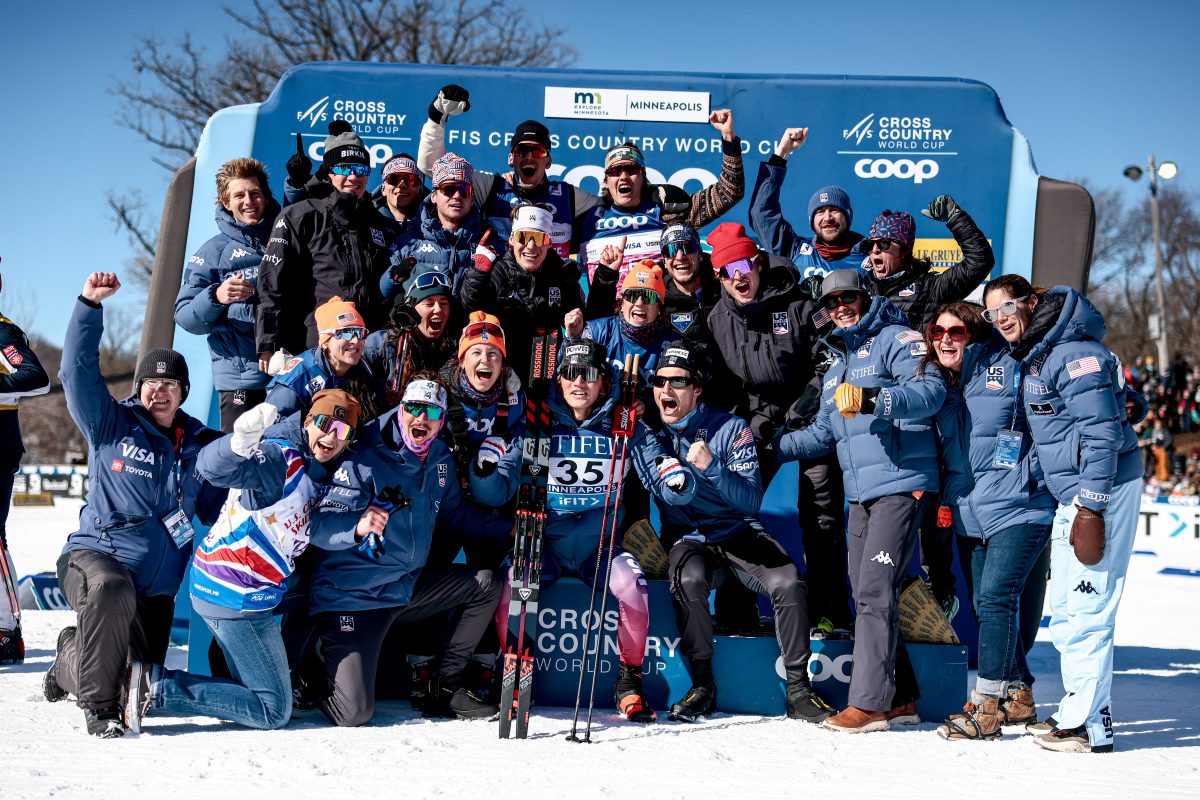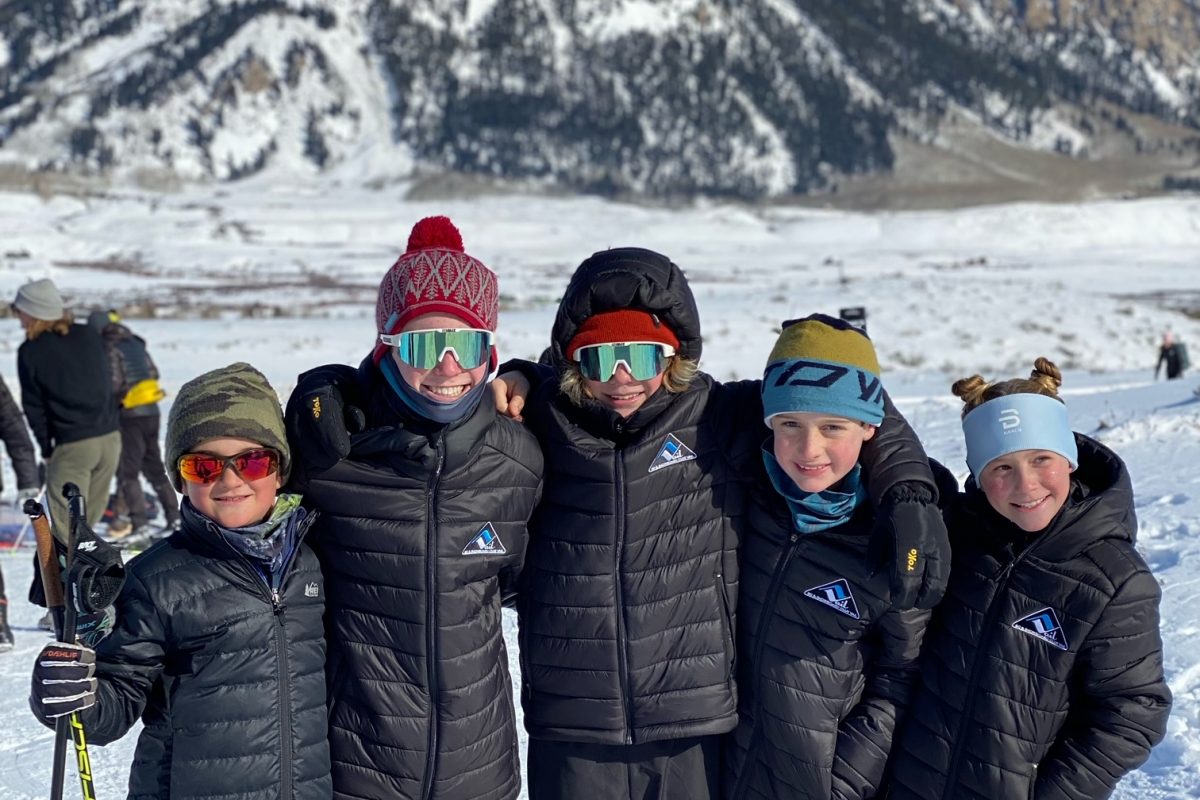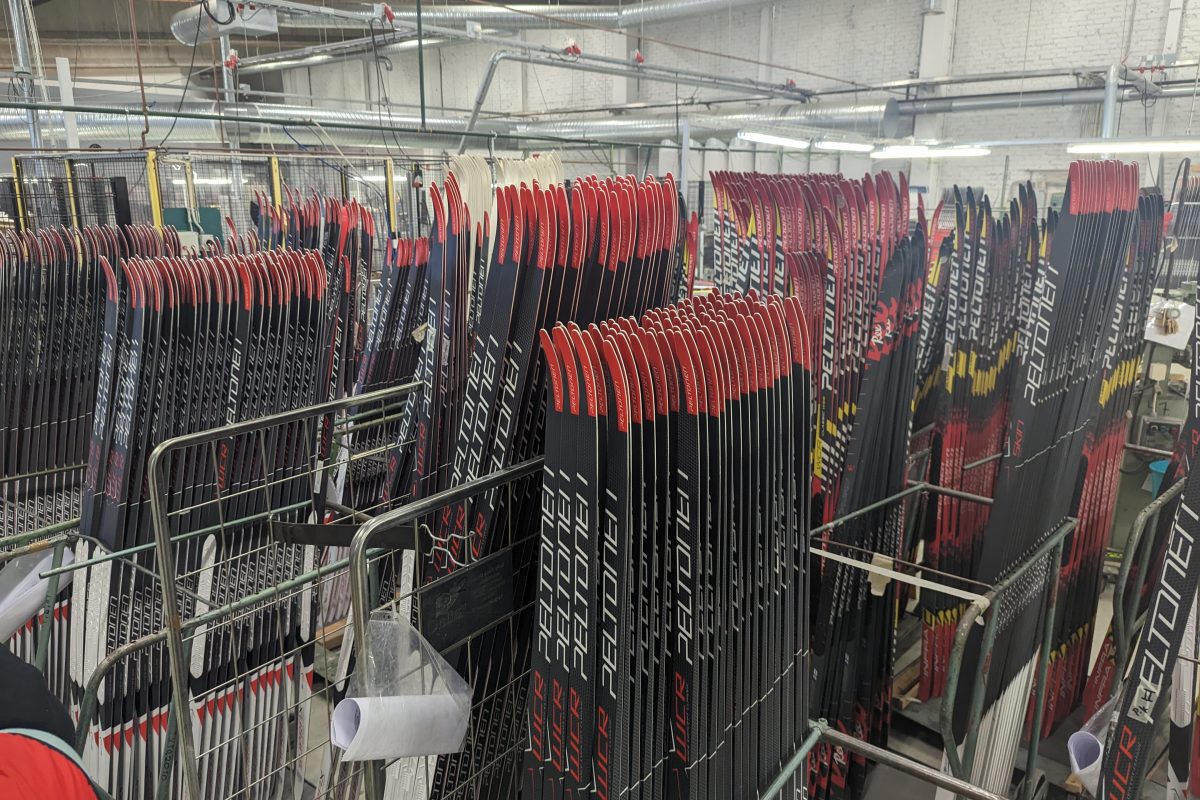Matt Liebsch enters the 2009-2010 season coming off of a killer season. Last year, he was third place at U.S. Nationals in Anchorage in the 15-kilometer skate, and he dropped the field on his way to nearly a 45-second victory in the American Birkebeiner. Liebsch currently trains with CXC, and he was able to take a few minutes to talk with FasterSkier after his kids had finished their lunch.

FasterSkier: Last year was a pretty good one for you-winning the Birkie, third at U.S. Nationals, etc. What was different between this year and last?
Matt Liebsch: I was reaping the benefits of a higher level of training over the last couple years. Two years ago I had a huge bump in training, and was a little burned out and overtrained. This last year, instead of training through some of those periods, when I was getting tired I listened to my body a little more and was better with keeping my health up. Three years ago, when I started with CXC, I went from 400 to 600 hours a year and I saw a big jump in results, then I went from 600 to 800, and that put me under a little bit. Last year I was a little bit more conservative and came in more like 650 or 700 with some good rest in there, and taking time off when I needed it, and I think that really helped, because staying healthy really is a big factor. I always did really well in skate races-I think skating comes more naturally because I came from a hockey background. I got cut from my high school hockey program, and I skied to stay in shape for soccer, which was a summer and fall sport. I did get out wakeboarding last week though.
FS: Is winning the Birkie all it’s cracked up to be? How big of a goal was that for you?
ML: My goal for last year was to ski really fast at nationals, and to try to make the World Cups, which I did do. The next goal beyond that was to try to ski well enough to make World Championships, which didn’t happen. So I had this fitness I felt like I could capitalize on for certain races. I kind of tried to put in a little effort to push for the Birkie and some other marathons, and to try to ski well in Fairbanks for distance nationals, and that was unfortunately the only time I got sick last year.
It’s one of the best places to makes some cash from ski racing, and it also did a lot for me for name recognition. I think that was the seventh Birkie I’ve done, so I had Birkie fever before I really knew what Nationals was all about, or even the Supertour. That’s kind of my road to marathon racing-backwards.
FS: You’re training with CXC-how is that going for you? Are you training mostly at home, or with the team? You have a family, right?
ML: I just had a training camp last week in Hayward, and I’ll do training camps throughout the summer and fall, and I’ll travel with them for racing.
I have two kids now, one’s a month old, and one is sixteen months-they keep me busy. It’s a little crazy, two kids is definitely-I thought two was going to be twice as much work as one, and it’s actually two and a half times as much. The traveling without them is kind of tough. This last week at training camp I ended up bringing the whole family up with me. This weekend I’m leaving to go skiing on the Haig Glacier with Brian Gregg. I’ll be down for ten days, and it’s going to be tough. I get back and then I’ve got camp with CXC, too, so it looks like I’m going to have some time away from family. It’s really tough, especially leaving my wife at home with two kids that whole time. The good thing is that both of our parents live within 15 minutes of us, so we have help. I don’t think I’d be able to do this if we didn’t live next to our parents. Plus, my wife’s really good with kids-she has a teaching degree and was a nanny for five summers. I’m going to try to bring them along as much as I can-when my family’s happy, I end up racing better usually.

FS: What are your goals for the upcoming season-obviously the Olympics are big, but which events?
ML: That’s the ultimate goal, to go there and try to ski well. I’d really like to ski the 15-kilometer skate race there, and maybe a leg of the 4x10k relay if I’m skiing well. Some goals to get to that spot are, before nationals, I’d like to win 2 NorAm Supertour races-Yellowstone and Whistler-and I’d like to see my classic skiing come up a little bit. I’m working with Bryan Fish and our new coach, Igor, on some new classic stuff. I’m going to be working on that on this 9-day snow camp, with video and a lactate monitor. And it will be good up to get into altitude in the mountains-it’s always good being from the flatlands to get up into the mountains.
FS: I heard you were in a bicycle accident earlier this year-can you tell me about that?
ML: That’s kind of been the only real pitfall of my training. I kind of blocked out this month after the baby was born, which I knew would kind of be lower-key training-just kind of getting into good routine being a dad and stuff. But our little one was born, and she was actually really mellow and slept for 20 hours a day. I ended up not really missing a beat in training and feeling good, and then a couple of weeks after she was born I was biking over to GearWest, and just a minute into my bike ride a car went through a stop sign and t-boned me. I had road rash and some bruising, and my back’s been bothering me. It’s been getting better, though-the first two weeks I was kind of ornery and didn’t really sleep very well, but it’s probably 95 percent healed. I’m back to everything except heavy weightlifting, and sometimes after really hard running efforts it will hurt the next day. Rollerskiing has been good. If I had to do it, that was probably a really good time to do it. I was pretty happy I had a helmet on, though-it was just kind of a headache with insurance companies dealing with my medical bills and my bike.
FS: Caitlin Compton mentioned to me in an earlier interview that you are an electrical engineer-are you doing that now? Is that what you’re hoping to do when you’re done skiing?
ML: I’m not doing anything right now with it. Last December right before U.S. Nationals I was laid off from my job, and I’ve been unemployed since then from an engineering standpoint. I’m still looking for that new job-my old job was good, because they allowed me flexibility to get the training I needed. The economy’s not doing so great right now, so there are a lot of engineers that are out of work. We’ll be living cheaply.
FS: How was it when you were still working?
ML: It definitely required some juggling and some compromises on both ends. I definitely think I probably skied a little faster last year, because maybe that recovery aspect was a little bit better. I think I still would have skied that fast had I had my job last winter, because I was laid off just a week and a half before U.S. Nationals-maybe I skied a little faster because I was irritated, but I think two years ago I learned some lessons on training and listening to my body, and not stepping too far over that edge. I think last year I was going to ski fast last year regardless of what I was doing. I can usually juggle a fair amount of things at one time. Every now and then I get tired, but the job thing I don’t think would have slowed me down. Most of my training from all of last year came when I had my job. I think I was averaging close to 32 hours a week for the whole year. Some of those hours would come when I was on the road because I would work remote-it was probably 28 of those hours in the office. It required training at 6:30 or seven in the morning, finishing my workout at work, showering at work, working six or seven hours usually, training again in the afternoon, getting home at 5:30 or six, and mellowing out with the family. Mondays were off, so I’d put I in a big workday. It was full, but it was nice still having my foot in the door in the professional world. For me I definitely think it’s possible to balance a job maybe three-quarters time with ski racing, but a lot of times engineering jobs mean 50 to 60 hours a week, and that’s not realistic. I can probably train 30 hours a week and work 600 hours a year, and if I didn’t have to work I could probably train 800 hours a year. There are definitely some times when you feel blown out. Doing that enough for a long enough period kind of put me in a state of continued sickness and tiredness. Last year I prioritized which workouts during the week that I needed to get done. Thresholds and intervals and distance one day a week was good, but those 2 hours skis-you cut some of those out, and it’s not a big deal. As long as I could get those key workouts in and take rests when I needed it, I felt 100% better last year.

FS: On your web site, your bio says that you went to the University of Minnesota. They don’t have a ski program, do they? What were you doing while you were there?
ML: I did a 4.5 year degree program. They just have a club team, and we had a good group of guys that would like to get out and train. We didn’t really do the Supertour stuff-we just did the marathon racing. That’s where I realized some potential in skiing was when I did some marathon racing, and did much better than I did in high school, and because of that I wanted to train harder and do better at racing. I did some higher-level training-Piotr Bednarski from GoTraining and US Biathlon-he was really good for me to get plugged into. He taught me some good training methods and kind of opened my eyes up a little bit to a higher level of training. I still think of Piotr as my club coach.
CXC was just starting up when I was finishing school. I thought, “this looks kind of cool.” I didn’t know what CXC was even about, and how serious it would be, but I put my name in that hat with the team, and I may have been one of the last ones on the list, and then I got in, and it was really good. I remember the first training camp, getting so blown out doing a mountain bike ride with my coach-I’m pretty sure I was at level four for two hours. If CXC hadn’t picked me up, I don’t think I would have been in the sport I am today. Before, I had a good motor, but the technique was definitely unrefined.
FS: It’s certainly a unique route to skiing at the elite level.
ML: I don’t know if I recommend that route for most people. I’m a pretty ambitious person, and when I set a goal for myself I usually like to get there. Going through engineering school was just as tough as anything else I’ve done in my life. I fell in love with the sport in high school, and in college I wanted to do it to have fun and stay in shape. I think skiing was kind of my release when I was having a tough time in school. I think maybe some kids in college get kind of burnt out. For me, it was like, “okay, I gotta cram in this three hours of training because I get to meet Piotr’s group for a three-hour rollerski, and that will be one of the funnest things I do all day.”
FS: Does it make you especially proud to have the success you’ve obtained, given that you haven’t gotten the same support that other elite skiers have had throughout their careers?
ML: Maybe a little bit of pride, but more wonderment that I came through it. I’m really happy I have my degree now, especially now with kids. If I had kids now, I don’t think I could go do the schooling with the young family-I think that would just be insane. For school, it was a good time to get it done for me, and there’s a chance when I’m done a little later in life that I’m going to go back and get my masters or an MBA or something. School still feels too recent, though.
FS: Are you going to keep going after this year?
ML: I have to kind of wait and see, and that will definitely be a family discussion. There are a lot more people involved than just me and what I want to do. I’d like to continue going-I don’t think I’ve reached my potential for sure, and I think I’m just going to get faster as the years continue. At this time I’m not sure, but I’m going this year for sure 100 percent in and doing everything right, training right, and I’m always going to be involved in the sport at some level. I think a lot of elite racers, when they’re done, they just get out of it, but then there’s other guys like Chad Giese, who still is out there, hammering around and he’s working a pretty tough job with a lot of hours. I don’t want to get burnt out from ski racing and then when I’m done not want to do it any more. I’m not going to be too prideful that I can’t get out there and get my but kicked. I just like the feeling of being on skis.
Nathaniel Herz
Nat Herz is an Alaska-based journalist who moonlights for FasterSkier as an occasional reporter and podcast host. He was FasterSkier's full-time reporter in 2010 and 2011.



